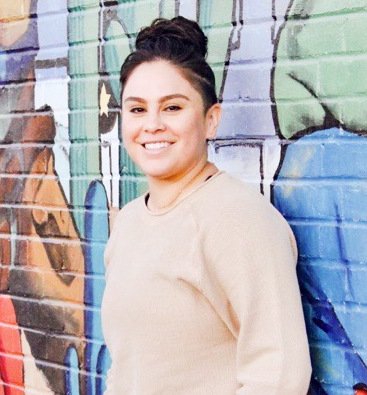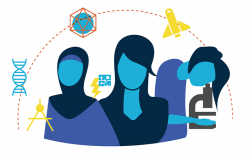Meet Dalila Paredes, Executive Dean and Notable Women in STEM

Can you explain to us what you do?
I am the Executive Dean of STEM at Shoreline Community College. As I tell my nieces (3rd and 4th graders) it’s like being a principal, but for college.
I didn’t know this growing up, but there are many different pathways in STEM. You can get a university degree and do research and become an astronaut, doctor, engineer, things like that. We also have programs for folks who want to get certificates — for instance, if you want to make screws or bolts for an airplane you can get a certificate in advanced manufacturing. Or you can get a certificate in biomanufacturing and help create medicines on a larger scale.
As Executive Dean of these programs, I make sure that we have enough faculty to teach them. I also make sure that we have enough money and resources to have the best machines and the most up-to-date lab technologies. That way, when our students go off into the real world, they know exactly what they’re getting into.
What was your education and or career path? How did you get to where you are now?
I started my formal education at Seward County Community College in Liberal, Kansas where I played softball while getting my Associates in science.
The next part of my education was where it got a little sketchy. I was back in Texas where I double-majored in chemistry and biology. One of the coolest things that happened to me is that I failed, but I failed up. Senior year, I took biochemistry and there was a test on the first day of class. I got a 12. The professor said if you didn’t make an 85, you should drop the class. Now, I had this innate resilience in me – I think it’s the Latina in me – who’s like: “you’re not going to tell me what to do! I paid for this class. I’m going to stay, and I’m going to try to figure it out.” I got tutoring and one-on-one support from the teacher’s assistants and ended up getting an A on the final. I went from almost not taking the class to getting an A because of the support I got.
That class paved the way for the future for me. This particular professor, who I was convinced hated me from day one when I got a 12, ended up telling me: “I’m really impressed with your work ethic and would love for you to study under me in graduate school.” I stayed and got my graduate degree in biochemistry.
After that, there was an opening for a chemistry teacher at a community college in my rural, Texas hometown. I also taught chemistry at Clark College in Vancouver, for about 10+ years altogether.
What or who are some of your most important influences that guided you to STEM?
The biggest influence for me is my family. My family set me up for success and it’s not lost on me how incredibly lucky I am to have had such a supportive foundation to launch from. We knew that education was our ticket out of poverty, so it wasn’t about whether we would get an education, but what we were going to do afterward. My mom and dad’s generation were the ones who set up that foundation.
My family also taught me resilience, and it wasn’t even intentionally taught – it was a matter of living. I grew up incredibly poor. A story that I often tell is going to bed hungry and waking up to my mom cooking my dad breakfast before he went to work. I crawled into his lap and was like: “Dad, I’m really hungry.” He let me eat his plate and then he went to work hungry.
We also got held up at gunpoint when I was in the 6th grade. That is not a typical experience for a lot of folks. It’s a bonding experience that I have with some of my students – when they talk about gun violence, I’m like: “Oh dude, me too.” There are so many of these experiences that I’ve had to live through to be where I am, and it has made me resilient.
Here at Washington STEM, we’re starting to talk about math identity. A positive math identity– knowing you can do math and that you belong in mathematics – helps students succeed in STEM. What were some of your earlier experiences in math and how do you think that impacted your career choice?
This is where my whole math identity fell apart – I clearly remember being in 3rd grade. My teacher’s name was Mrs. Hicks, and she was teaching us multiplication that day. At the time, one of my close family members who lived with us was going through a depressive bout, and that deeply affected me. I couldn’t concentrate in class – and I was a good student! – so when I turned in my multiplication tables that day, I got less than a 10. My teacher was like: “What is wrong? This is not you.” I remember being so keenly aware that our home situations have such a profound effect on how we show up in class.
Ever since then, I told myself the story that I was never good at math, but it all tied back to this thing that was happening at home. Our math identity isn’t necessarily tied to our actual ability – it’s more about the story we tell ourselves. I never felt super successful in math, but I knew that that was something that I would have to get more support with, and that’s how I navigated it in college.
What is your favorite part of your job?
My favorite part is human connection – whether it’s with students, my colleagues, or community members. We have a childcare center on campus, so there are two- and three-year old kids walking around holding onto this rope between their teachers – I’ll walk past and give them high fives. That’s what I’m here for – I’m here for the humans.
What do you consider your biggest achievement in STEM?
My biggest achievement is maintaining my integrity with all of my identities.
There is so much pressure from life, society, and family telling you that you have to be this thing or that thing – and if you’re not, then you don’t belong there. Even if it’s not overtly said, you feel it. The data is crystal clear that my identities don’t do well in STEM. I am a first generation, queer, indigenous Latina in STEM. All of the data shows that I should not be here. I shouldn’t be in this position of leadership – less than 10% of leaders are women of color. To maintain my spot in this leadership role and maintain my sense of self, makes me proud.

Are there any stereotypes about women in STEM you’d like to personally dispel?
Yes. Where do I even begin? The stereotypes are garbage, except the ones that say we’re just as competent and just as able as anyone else. I’ll leave it at that.
What unique qualities do you think you bring to STEM?
My life experiences. I bring a unique perspective to problem solving and decision making that is largely absent in higher education because we’re just not at the table. It’s such a privilege, but it’s also a responsibility – and again, it ties back to my identities and making sure that I do well, not just for myself, but for the larger communities that I represent.
Different is really powerful in this day and age. I actually see my differences as skills that not a lot of other people have.
What would you like to say to young women thinking about beginning a career in STEM?
Do it. You don’t have to be perfect at it – expect to fail.
As a matter of fact, my friend just gave me a book about a rock climber. The crux of the book is that you will fall, but to listen to what the falls tell you. Understand that failure is part of the learning experience. That also fits into this notion and concept that the dominant culture embeds into us – that we always have to be perfect. And that’s especially true of women, right? I want to dispel that completely from the top down and the down to the top – you do not have to be perfect. If that is your goal, you’re in the wrong field. We goof, we learn, we do better next time, and we keep going.
Can you share a fun fact about yourself?
My dad’s side of the family is from Spain; my mom’s side is from northwestern Mexico, where there are a series of white canyons or barrancas called the Copper Canyons. These things are super deep, right? Like 10 times bigger than the Grand Canyon. My ancestors were, and still are, Indigenous Mexican Americans who live in these canyons – the Rarámuri.
Have you ever seen those mountain goats that are on the side of a mountain and trying to walk at an angle? My people climb these walls with no shoes – we hate shoes, it’s not how we roll. (As a matter of fact, I’m not wearing shoes as we speak.)
Understanding the history of where my family came from – from caves, to being back breaking farmers with less than a third-grade education, and then there’s me, who ends up in a position like this? It’s surreal to even think that I could be here.